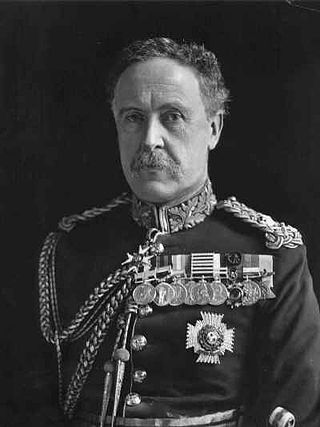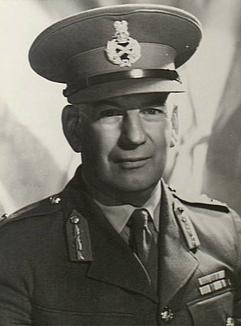Related Research Articles

The 4th Infantry Division was a regular infantry division of the British Army with a very long history, seeing active service in the Peninsular War and Waterloo Campaign, the Crimean and Boer Wars and both World Wars. It was disbanded after the Second World War and reformed in the 1950s as an armoured formation before being disbanded and reformed again and finally disbanded on 1 January 2012.
The Malaya Command was a formation of the British Army formed in the 1920s for the coordination of the defences of British Malaya, which comprised the Straits Settlements, the Federated Malay States and the Unfederated Malay States. It consisted mainly of small garrison forces in Kuala Lumpur, Penang, Taiping, Seremban and Singapore.

General Geoffrey Kemp Bourne, Baron Bourne, was a British Army officer.

General The Honourable Sir Neville Gerald Lyttelton, was a British Army officer from the Lyttelton family who served against the Fenian Raids, and in the Anglo-Egyptian War, the Mahdist War and the Second Boer War. He was Chief of the General Staff at the time of the Haldane Reforms and then became Commander-in-Chief, Ireland.
Lieutenant General Sir George Sinclair Cole was a senior British Army officer who achieved high office in the 1960s.

Major General John Stewart Whitelaw, was a senior officer in the Australian Army. Whitelaw was a graduate of the first intake of the Royal Military College, Duntroon and served briefly at Gallipoli with an infantry battalion during the First World War. His war service was, however, cut short by a bullet wound suffered during the landing on 25 April 1915 and he returned to Australia where, during the interwar years, he transferred to the artillery and undertook a number of staff and instructional postings. During the Second World War, although he did not serve overseas in an operational role, in his capacity as a senior artillery officer Whitelaw had responsibility for all matters relating to the development of artillery in the Australian Army and in this role he championed the introduction of new technologies and weaponry into the corps and the development of Australian defence industries.
The Coronation Honours 1911 for the British Empire were announced on 19 June 1911, to celebrate the Coronation of George V which was held on 22 June 1911.
The Diamond Jubilee Honours for the British Empire were announced on 22 June 1897 to celebrate the Diamond Jubilee of Queen Victoria on 20 June 1897.
Major-General Reginald Geoffrey Stirling Hobbs CB DSO OBE was a British Army officer who became Commandant of the Royal Military Academy Sandhurst.
The 1935 Birthday Honours for the British Empire were announced on 3 June 1935 to celebrate the Birthday and Silver Jubilee of King George V.
The King's Birthday Honours 1938 were appointments in many of the Commonwealth realms of King George VI to various orders and honours to reward and highlight the meritorious work of his subjects in those countries. The appointments were made to celebrate the King's official birthday and for the United Kingdom and Colonies were announced on 7 June 1938.
The King's Birthday Honours 1939 were appointments in many of the Commonwealth realms of King George VI to various orders and honours to reward and highlight good works by citizens of those countries. The appointments were made to celebrate the official birthday of the King. They were announced on 6 June 1939 for the United Kingdom and Colonies.
The King's Birthday Honours 1923 were appointments in many of the Commonwealth realms of King George V to various orders and honours to reward and highlight good works by citizens of those countries. The appointments were made to celebrate the official birthday of The King. They were published on 1 and 29 June 1923.
The 1905 Birthday Honours for the British Empire were announced on 30 June, to celebrate the birthday of Edward VII on 9 November.
The New Year Honours 1914 were appointments by King George V to various orders and honours to reward and highlight good works by members of the British Empire. They were announced on 2 January 1914.
The King's Birthday Honours 1931 were appointments by King George V to various orders and honours to reward and highlight good works by members of the British Empire. The appointments were made to celebrate the official birthday of The King. They were published on 2 June 1931.
The 1939 New Year Honours were appointments by King George VI to various orders and honours to reward and highlight good works by citizens of the United Kingdom and British Empire. They were announced on 30 December 1938.
The 1927 Birthday Honours were appointments by King George V to various orders and honours to reward and highlight good works by citizens of the British Empire. The appointments were made to celebrate the official birthday of The King, and were published in The London Gazette on 3 June 1927.
The 1917 New Year Honours were appointments by King George V to various orders and honours to reward and highlight good works by citizens of the British Empire. The appointments were published in several editions of The London Gazette in January and February.
The 1919 New Year Honours were appointments by King George V to various orders and honours to reward and highlight good works by citizens of the British Empire. The appointments were published in The London Gazette and The Times in January 1919.
References
- ↑ "No. 36908". The London Gazette (Supplement). 23 January 1945. p. 566.
- ↑ "Major General Arthur Stewart Cox". The Times. 28 November 2003. Retrieved 7 January 2019.
- ↑ "D Battery History". 3rd Regiment Royal Horse Artillery Past and Present Members' Association. Retrieved 7 January 2019.
- ↑ "Army Commands" (PDF). Retrieved 2 July 2016.
- ↑ "Major-General Arthur George Ernest Stewart Cox". The Peerage. Retrieved 7 January 2019.